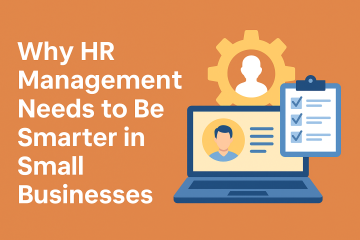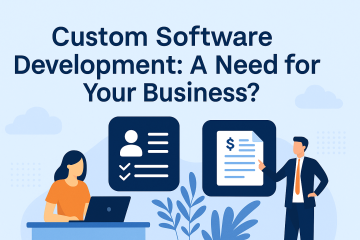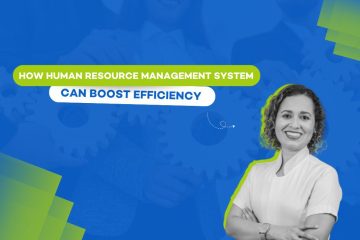Introduction
In today’s fast-paced work environment, businesses must find ways to streamline HR processes while empowering employees. A Human Resource Management System (HRMS) equipped with an employee self-service portal achieves both by enabling employees to manage their own HR-related tasks. These portals reduce the administrative burden on HR teams, improve employee satisfaction, and drive organizational efficiency.
For businesses in Delhi, partnering with a software company in Delhi ensures a tailored HRMS solution that incorporates advanced self-service features to meet unique workforce needs.
In this article, we’ll explore the top 5 benefits of employee self-service portals in HRMS and why businesses should adopt them.
What is an Employee Self-Service Portal in HRMS?
An employee self-service portal is a feature within a Human Resource Management System (HRMS) that allows employees to access and manage their HR information independently. From viewing payslips and applying for leave to updating personal details and tracking performance, these portals empower employees to handle routine tasks without HR intervention.
Key Features of an Employee Self-Service Portal
- Payslip and Salary Details Access
- Leave and Attendance Management
- Profile Updates (e.g., Address, Bank Details)
- Performance and Appraisal Tracking
- Access to Company Policies and Training Resources
Top 5 Benefits of Employee Self-Service Portals
1. Reduces Administrative Workload
One of the biggest advantages of self-service portals is the reduction in administrative tasks for HR teams. Employees can handle routine activities like applying for leave, downloading payslips, or updating personal information without requiring HR intervention.
Example: Instead of HR manually updating an employee’s new bank details, the employee can do it themselves, saving time and effort.
2. Enhances Employee Engagement and Satisfaction
When employees have quick access to their information and greater control over HR tasks, they feel more empowered and valued. Transparency in processes like leave approvals and performance tracking builds trust and improves morale.
Key Impact: Engaged employees are more productive, leading to better business outcomes.
3. Improves Accuracy of Employee Data
Allowing employees to update their own information ensures that HR records are accurate and up to date. This reduces errors caused by manual entry and prevents delays in processing payroll or benefits.
Example: Employees can immediately update their contact information if they move to a new location, ensuring that all communications reach them promptly.
4. Saves Time for Both Employees and HR Teams
With self-service portals, employees no longer have to wait for HR to process simple requests, such as providing payslips or leave balances. This saves time for both parties and allows HR to focus on strategic initiatives.
Example: An employee can quickly check their leave balance and apply for vacation days through the portal without needing HR assistance.
5. Boosts Organizational Efficiency
By automating and streamlining HR processes, self-service portals contribute to overall organizational efficiency. Employees have 24/7 access to HR tools and resources, ensuring that tasks are completed promptly without delays.
Key Outcome: Faster processes mean more time for employees to focus on their core responsibilities, driving business growth.
The Role of a Software Company in Delhi in Implementing HRMS
For businesses in Delhi, choosing a software company in Delhi for HRMS implementation ensures that the solution is tailored to meet local compliance requirements and organizational goals.
1. Customization and Integration
Delhi-based software companies specialize in customizing HRMS platforms to align with business workflows and integrating them with existing tools like payroll and accounting software.
2. Scalable Solutions
A reliable software company offers scalable HRMS solutions that grow with the business, accommodating an increasing workforce and evolving needs.
3. Support and Maintenance
These companies provide ongoing support and regular updates to ensure the HRMS operates smoothly and remains up to date with industry trends.
How to Choose the Right HRMS with a Self-Service Portal
When selecting an HRMS with a self-service portal, consider the following:
- Ease of Use: Choose a platform with an intuitive interface for employees of all tech skill levels.
- Mobile Accessibility: Ensure the system is mobile-friendly, allowing employees to access it on the go.
- Customization: Opt for a solution that can be tailored to meet your organization’s specific needs.
- Integration Capabilities: The HRMS should integrate seamlessly with other tools like payroll and accounting systems.
- Support Services: Select a provider that offers training, ongoing support, and regular updates.
Future Trends in Employee Self-Service Portals
1. AI-Driven Insights
AI-powered self-service portals will provide personalized insights, such as career development recommendations based on employee performance.
2. Voice Assistance Integration
Voice commands will enable employees to interact with self-service portals for tasks like checking leave balances or updating profiles.
3. Enhanced Security Features
Advanced authentication methods, such as biometric logins, will ensure secure access to sensitive employee data.
4. Wellness and Engagement Tools
Future portals will integrate wellness programs and employee engagement tools, fostering a healthier and happier workforce.
Conclusion
An employee self-service portal within a Human Resource Management System (HRMS) is a powerful tool that transforms HR operations. By reducing the administrative workload, improving data accuracy, and empowering employees, these portals enhance productivity and satisfaction across the organization.
For businesses in Delhi, partnering with a software company in Delhi ensures the implementation of a tailored HRMS solution that meets local needs and drives success. By adopting an HRMS with self-service capabilities, businesses can streamline processes, engage employees, and focus on achieving their goals.



0 Comments